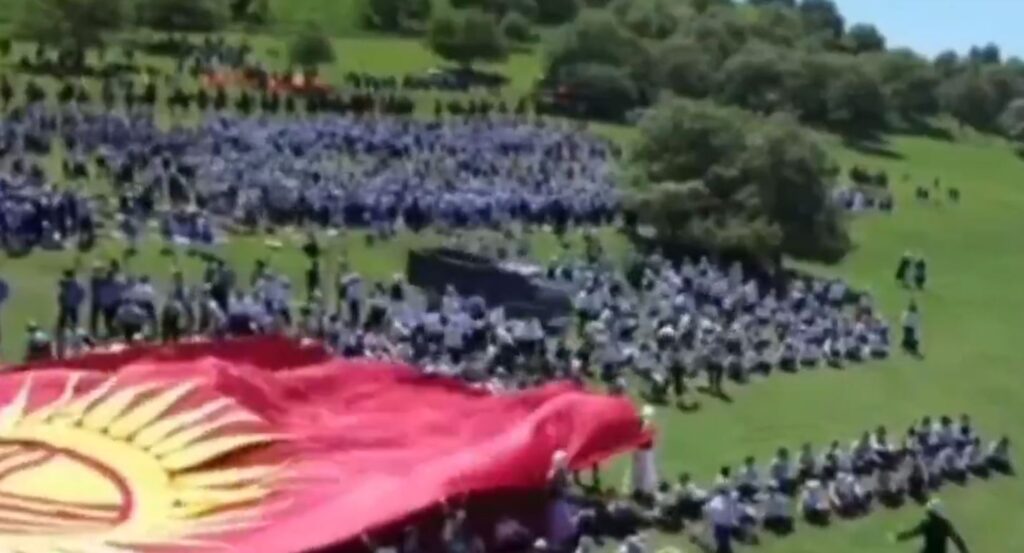BISHKEK (TCA) — The State Committee for National Security of Kyrgyzstan (SCNS) and General Prosecutor’s Office are detecting social-media users who speak negatively about the President of Kyrgyzstan Almazbek Atambayev. This issue was discussed in the Kyrgyz parliament this week.
The checks have been conducted at the request of a parliament member from the pro-presidential Social Democratic Party, Irina Karamushkina, who urged to punish those criticizing the President’s actions.
On December 27, MP Karamushkina received a reply from the National Security Committee which said it had identified 10 users but their IP-addresses were registered abroad and it was not possible to take measures against them.
Several residents of the Jalal-Abad province were summoned for questioning and warned of criminal liability for statements that “defame the honor and dignity of the President”, expert Rasul Umbetaliev told Bely Parus information agency.
MPs for criticism without abuse
Some MPs considered the SCNS actions as pressure on the freedom of speech.
Many MPs are active social-media users and believe it is possible to criticize the President, Government and parliament deputies, but the posts should not contain abuses or affect anyone’s privacy. The national security should check the social media to reveal extremist appeals and protect the country’s security, MPs say.
However, Facebook posts and comments with negative remarks about state officials cannot be considered threats to national security. The SCNS is just wasting time, money and energy for unnecessary activity instead of preventing border conflicts and combating terrorism.
If the authorities want to monitor the social networks, they should adopt an appropriate law and recognize the Facebook as a mass media outlet, MPs say.
Freedom of speech
Moldakun Abdyldaev, the President’s envoy to the Parliament, told the media that there was nothing illegal in the SCNS actions. There is no pressure on the freedom of speech, he added.
The SCNS examines social-media posts in line with the law on guarantees of the President’s activity, Abdyldaev said. The law states that the General Prosecutor’s Office shall protect the honor and dignity of the President in case of dissemination of impartial information about him. The General Prosecutor’s Office may assign this task to other state agencies, and can also apply to court to protect the President. The National Security Committee has examined the social networks at the request of an MP, he added.
Facebook not a media outlet
Kyrgyzstan may soon forget it once was a democratic country if the SCNS detains citizens just for posting ‘likes’ in the social networks, said Aida Salyanova, an MP from the Ata Meken opposition parliamentary faction and former Prosecutor General.
According to MP Natalia Nikitenko (Ata Meken), the General Prosecutor’s Office has the right to defend the honor and dignity of the President but it should be done in the court. Also, by Kyrgyz laws, Facebook is not a mass media outlet but just a platform to exchange views. It is also not a legal entity or an individual. There were no lawsuits filed by the General Prosecutor’s Office and heard in courts in relation to insulting the honor and dignity of the President. Therefore, there was no ground for the National Security Committee to conduct the checks, Nikitenko concluded.
In a democratic country, as we position Kyrgyzstan, there should be no persecution or atmosphere of fear and pressure, especially with the involvement of the National Security Committee, Nikitenko believes.
The freedom of speech is among the main principles of democracy. There is a lot of criticism in the Internet, and it is normal, she added.
MP Karamushkina, however, believes the National Security has the right to issue an official warning, as the freedom of speech does not mean permissiveness, she explained. She said she had submitted an official request to the National Security Committee based on the law “On the status of parliament deputy”. “The President’s personality has been insulted for five years (of his presidency). Citizens should not be insulted. And the President, too, is a citizen of our country,” she concluded.
Electronic media
MP Dastan Bekeshev (Social Democratic Party) recently wrote on his social-media page that it is time to revise the law on the media because the current law does not regulate electronic media.
Lawyers and media experts explained that, despite the fact that the electronic media should not be registered, they are responsible for their publications along with other media.
A person cannot be brought to justice for posting critical remarks in the social media, but he or she can be accused of “approval of extremism and terrorism”.
According to lawyers of Kyrgyzstan’s Media Policy Institute, the recent amendments to the law on combating extremism and terrorism have tightened the responsibility for dissemination of information in the Internet. The authors of the amendments apparently adopted the idea of Russian colleagues, as the Russian law provides for the responsibility for “public approval” of extremism and terrorism.
Appeal to Prosecutor General
The head of the Adilet Legal Clinic and ex-MP Cholpon Jakupova submitted an appeal to the Prosecutor General concerning the actions of MP Irina Karamushkina with regard to illegitimate restrictions of the freedom of speech.
According to the current legislation, the publication of negative information related to the President of Kyrgyzstan is not a crime or offense, Jakupova said. There is a big difference between the concepts of “negative information” and “information defaming the honor and dignity of a person”, she added. A citizen can be brought to justice only for spreading information discrediting one’s honor and dignity, but not for negative publicity, Jakupova said.
The Kyrgyz Constitution guarantees the freedom of expression. Article 31 of the Constitution reads: “In the Kyrgyz Republic, everyone has the right to freedom of expression, freedom of speech and press. No one can be forced to express his or her opinion or to deny it.”









